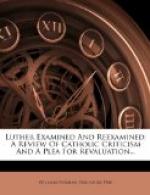With excellent discrimination Mosheim has traced the origin of monasticism to the early Christian fathers. The earliest impulses to monasticism are contained in such writings as the Epistle to Zenas, found among the writings of Justinus, the tracts of Clement of Alexandria on Calumny, Patience, Continence, and other virtues, the tracts of Tertullian on practical duties, such as Chastity, Flight from Persecution, Fasting, Theatrical Exhibitions, the Dress of Females, Prayer, etc. These writings “would be perused with greater profit, were it not for the gloomy and morose spirit which they everywhere breathe. . . . In what estimation they ought to be held, the learned are not agreed. Some hold them to be the very best guides to true piety and a holy life; others, on the contrary, think their precepts were the worst possible, and that the cause of practical religion could not be committed to worse hands. . . . To us it appears that their writings contain many things excellent, well considered, and well calculated to kindle pious emotions; but also many things unduly rigorous, and derived from the Stoic and Academic philosophy; many things vague and indeterminate; and many things positively false, and inconsistent with the precepts of Christ. If one deserves the title of a bad master in morals who has no just ideas of the proper boundaries and limitations of Christian duties, nor clear and distinct conceptions of the different virtues and vices, nor a perception of those general principles to which recurrence should be had in all discussions respecting Christian virtue, and therefore very often talks at random, and blunders in expounding the divine laws; though he may say many excellent things, and excite in us considerable emotion; then I can readily admit that in strict truth this title belongs to many of the Fathers. . . . They admitted, with good intentions no doubt, yet most inconsiderately, a great error in regard to morals, and pernicious to Christianity; an error which, through all succeeding ages to our times, has produced an infinity of mistakes and evils of various kinds. Jesus, our Savior, prescribed one and the same rule of life or duty to all His disciples. But the Christian doctors, either by too great a desire of imitating the nations among whom they lived, or from a natural propensity to austerity and gloom, (a disease that many labor under in Syria, Egypt, and other provinces of the East,) were induced to maintain that Christ had prescribed a twofold rule of holiness and virtue; the one ordinary, the other extraordinary; the one lower, the other higher; the one for men of business, the other for persons of leisure, and such as desired higher glory in the future world. They therefore early divided all that had been taught them either in books or by tradition, respecting a Christian life and morals, into Precepts and Counsels. They gave the name Precepts to those laws which were universally obligatory, or were enacted for all men of all descriptions; but




